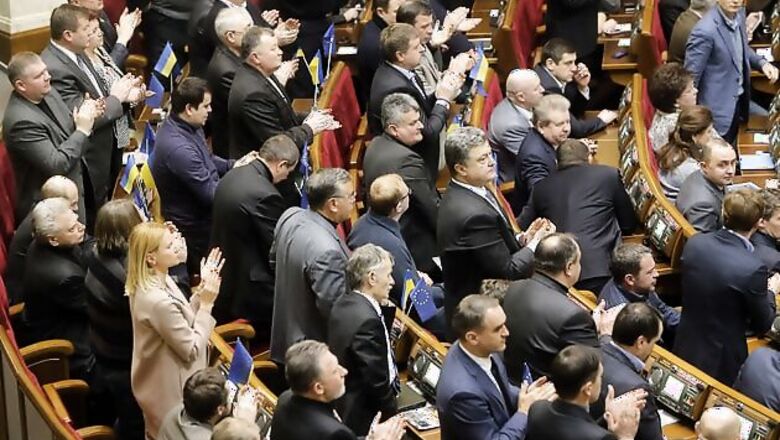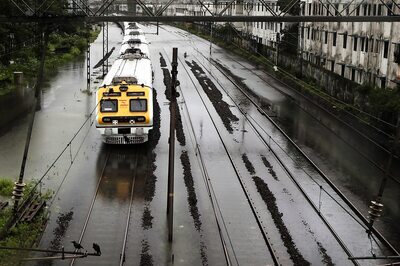
views
In back-to-back moves aimed at defusing Ukraine's political crisis, the prime minister resigned on Tuesday and parliament repealed anti-protest laws that had set off violent clashes between protesters and police.
The two developments were significant concessions to the anti-government protesters who have fought sporadically with police for the last 10 days after two months of peaceful around-the-clock demonstrations.
The protests erupted after President Viktor Yanukovych turned toward Russia for a bailout loan instead of signing a deal with the European Union and have since morphed into a general plea for more human rights, less corruption and more democracy in this nation of 45 million.
The departure of Prime Minister Mykola Azarov removes one of the officials most disliked by the opposition forces whose protests have turned parts of Kiev, the Ukrainian capital, into a barricaded maze.
However, Azarov's spokesman told the Interfax news agency that another staunch Yanukovych ally, deputy Prime Minister Serhiy Arbuzov, will assume temporary leadership of the Cabinet, a move that is unlikely to please the opposition.
Other key issues remain unresolved in Ukraine's political crisis, including the opposition's repeated demand that Yanukovych resign and a new election be held.
Azarov's resignation came just before the opening of a special parliament session that repealed anti-protest laws that had set off violent clashes between protesters and police.
Earlier this month, Yanukovych pushed through the new laws to crack down on protests and increase prison sentences for creating disorder. The laws also prohibited demonstrators from wearing helmets and gas masks as many have done for fear that riot police would try to violently disperse protests.
Arseniy Yatsenyuk, a lawmaker and one of the opposition's top figures, hailed the parliament's move.
"We have repealed all the laws against which the whole country rose up," he said.
Over the weekend, Yanukovych offered the premiership to Yatsenyuk, but the opposition leader refused the post.
Parliament will consider an amnesty measure Wednesday for scores of arrested protesters. But Yanukovych has said the amnesty is only possible if demonstrators clear the streets and vacate the buildings they now occupy - a condition that is probably unacceptable to many.
The prime minister's departure on Tuesday brought encouragement to those at Kiev's sprawling protest encampment but no inclination to end their demonstrations.
"The authorities are afraid and making concessions. We should use this moment and continue our fight to achieve a change of power in Ukraine," said 23-year-old demonstrator Oleg Rudakov.
The opposition has accused Azarov of mismanaging the economy and condoning corruption, and has ridiculed the Russian speaker for his poor command of Ukrainian.
Animosity toward him grew after the protests started in November when he labeled demonstrators extremists and refused to listen to any of their demands. As head of the Cabinet, he was also seen as bearing responsibility for the recent use of force by police.
Yanukovych's cash-strapped government just managed to avoid bankruptcy with the money pledged in November by Russian President Vladimir Putin. Russia spent $3 billion to buy Ukrainian government bonds in December and has promised to spend up to $15 billion total.
Putin said on Tuesday that Russia will abide by the deal to buy those bonds and offer its neighbor cheaper natural gas even if the Ukrainian government ends up being led by the opposition.
Russia's main concern regarding Ukraine is to protect Russia's financial commitments, not geopolitical issues, Putin said in Brussels at a Russia-EU summit.
"Will we revise our agreements on credits and energy if the opposition comes to power? No we won't," he said.
The Russian leader also sharply criticized the European Union for sending high-level delegations to Ukraine during the anti-government protests, saying that could be interpreted as political interference.
"The more intermediaries there are, the more problems there are," Putin said. "Considering the specifics of relations between Russia and Ukraine, it is simply unacceptable."
In Washington, meanwhile, Vice President Joe Biden welcomed progress toward defusing the political crisis and urged Yanukovych to sign the repeal of the anti-protest laws without delay. Speaking by telephone for the third time in less than a week, Biden also encouraged the Ukrainian president to keep working with the opposition.




















Comments
0 comment